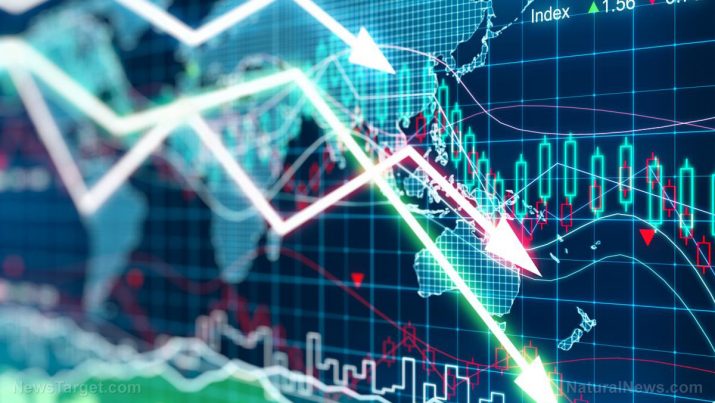
RBC analysts: US car sales falling to recessionary levels
Tuesday, June 07, 2022 by Belle Carter
http://www.naturalnewsreports.com/2022-06-07-analysts-us-car-sales-at-recessionary-levels.html

Analysts at the Royal Bank of Canada (RCB), a renowned financial services company that serves over 16 million clients worldwide, have said that the U.S. car industry is at recessionary levels as new-car sales dipped below an annualized 13 million vehicles in May.
“The market appears increasingly concerned about the economy, inflation, rising interest rates and a recession,” Joseph Spak, RBC Capital Markets head, said in their note.
The team of analysts have not yet seen any evidence of demand destruction. However, if a recession were to occur, it is likely that “recessionary” levels of demand are in the (12 million to 13 million) range, Spak said.
By the team’s estimate, the May light-vehicle seasonally adjusted annualized rate (SAAR) of sales is at 12.8 million vehicles. This is much lower than RBC’s forecast of 13.4 million vehicles and under April’s 14.6 million.
May had three fewer sales days, but the analysts pointed out that May is also when sales seasonally start to pick up.
Last week, Ford Motor Co. reported a 4.5 percent drop in May total sales, including a 4.4 percent decline in sales of SUVs and a 1.4 percent of pickup trucks.
Moreover, Evercore ISI, an independent global banking advisory firm, reported that by their reckoning SAAR came in at about 12.7 million, down about 11 percent from April’s 14.3 million.
The website MarketWatch mentioned that North American production improved slightly, but vehicles in transit or partially built were likely responsible for a drag of about 1 million units.
The two other main U.S. car makers, General Motors Co. and Tesla Inc., do not report monthly sales, and only provide reports in a quarterly basis. Their next report is expected in July.
Factors that led to dip in car sales
Michael Greiner, assistant professor at Oakland University School of Business Administration, cited three major occurrences that brought this economy-related issue the Americans are currently experiencing. (Related: Biden’s “inflation bomb” is “driving the economy into the ground,’ senators warn.)
Greiner mentioned the Wuhan coronavirus (COVID-19) pandemic as one of the factors. He said that during the pandemic, people shifted what they were spending money on. The American economy is about 70 percent a service-based economy, where most of the money spent goes toward what people do, as opposed to actual products.
“People were not able to go out to the gym. So instead of spending money on a gym, they bought a workout machine. They weren’t able to go out to restaurants, so instead, they bought a new refrigerator. And so there was this huge shift that we saw in terms of what people were buying, from services over to goods,” the assistant professor said.
He said that during lockdowns, people were not driving as much and consumers weren’t buying vehicles, either.
“The result of that, was that demand for these things went down and then the problem that manufacturers had, was that when they are making vehicles, for example, when they are drilling for oil, they can’t change the amount that they are producing at a moment’s notice. It takes them a long time to change these things,” Greiner mentioned.
The assistant professor also cited supply chain issues. He said that a classic example of this involves semiconductors. The shortage of semiconductor chips made it a real challenge for auto manufacturers to ramp up their production, Greiner said.
Finally, he said the Russia and Ukraine war is impacting fuel and food.
A month ago, Sara Menker, founder and CEO of agriculture analytics company Gro Intelligence, warned that there’s only 10 weeks of wheat supplies left in the world as Russian invasion disrupts production. Russia and Ukraine account for around a quarter of the world’s wheat exports.
Furthermore, since Europe imposed sanctions cutting the Russian crude supply, the U.S. and Europe are currently facing hikes in the prices of oil and commodities. India, which buys oil products from Russia at a cheaper price, refines it and then sells it to the U.S. and the European Union for massive profits.
Watch the below video as Joe Biden finally admits that inflation is up.
This video is from the Thrivetime Show channel on Brighteon.com.
More related stories:
Biden: Inflation is everybody’s fault but mine.
Globalism, central bank money printing are the real root causes behind inflation and shortages.
Ukraine reports two-thirds decrease in grain exports while global wheat prices skyrocket.
IMF: Russia-Ukraine war may FUNDAMENTALLY ALTER economic, political order worldwide.
Biden’s “Russian sanctions” are wrecking the western economy.
Sources include:
Tagged Under: Tags: bubble, car sales, collapse, debt bomb, debt collapse, economic collapse, economy, market crash, products, recession, risk, Royal Bank of Canada, US
RECENT ARTICLES


Mark Zuckerberg-funded group already trying to rig and steal 2022 midterms
By Ethan Huff

Biden regime mandates more corn ethanol in gasoline to damage the engines of cars and trucks across America
By Ethan Huff

Saudi Arabia hikes oil prices as Asia eases COVID-19 restrictions
By Belle Carter
Russia responds to another round of EU sanctions by restricting exports of noble gases like neon, which is essential for making computer chips
COPYRIGHT © 2017 NATURAL NEWS REPORTS


